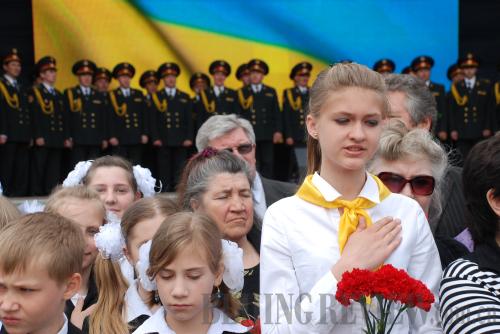|
Working together
 |
|
REMEMBRANCE: Kiev residents attend a ceremony marking the 25th anniversary of the Chernobyl nuclear disaster on April 26 (XINHUA) |
The harsh reality demands common sense on nuclear security: Nuclear accidents affect all of mankind, and nuclear security is not just a domestic issue, but a regional or global one. National sovereignty has its limits with respect to nuclear security.
We should put nuclear security before other economic and political interests, because the latter involves the short-term interests of certain people, but the former is relevant to the survival of a nation. No country should compel any other country to shoulder risks of nuclear accidents while using nuclear power for peaceful purposes, not to mention non-peaceful purposes.
A country has the right to make proposals, call for negotiations, and even request intervention from the UN Security Council when another country's nuclear-related activities pose or are likely to pose threats to its environmental security. No country should act on its own in the name of sovereignty on the nuclear issue, and the loss of certain sovereign rights is an inevitable cost of developing nuclear technologies.
To safeguard mankind's common interests, countries should step up cooperation on establishing an international nuclear security system under the UN framework. There are a few steps to take at present:
First, a reporting system for nuclear accidents should be established. This system calls on countries suffering nuclear accidents to report promptly, accurately and adequately on any progress in handling the accidents to neighboring countries, so they can take measures in a timely manner to reduce damages and prevent the disaster from escalating.
Second, in confronting nuclear disaster, all countries should share the spirit of helping and supporting each other. Once a nuclear accident occurs in one country, other countries should provide technical and material aid to the disaster-hit country to meet its needs. After the disaster is subdued, they should send experts to take joint efforts to conduct research, identify causes and find solutions for the effective prevention of such disasters in the future.
Third, guided by the UN, countries should strive to put in place an international nuclear disaster early warning mechanism. The UN should establish a special agency to monitor global nuclear safety, reporting on related developments promptly. Teams of professionals specializing in handling nuclear accidents should be set up, and technologies and equipment should be made ready for emergency calls.
Fourth, the international community should engage in extensive cooperation in using nuclear power safely for peaceful purposes under the framework of the NPT. Countries should establish a market for nuclear technologies to allow the sharing of these for the benefit of all. Those that don't abide by the NPT should not be entitled to the sharing of nuclear technologies.
Fifth, a new agency should be created under the administration of the UN to manage nuclear-capable countries' nuclear technologies, materials and equipment. The agency should be entrusted with the production, sales and supervision of nuclear materials and the recycling and disposal of nuclear wastes. In this way, it will help reduce occurrences of nuclear accidents in countries without sufficient technological guarantees, and prevent attempts to develop nuclear weapons in the name of using nuclear power for peaceful purposes.
Sixth, a system of stricter international supervision and punishment should be put in place. Comprehensive international legislation is needed to regulate the construction and management of nuclear facilities. For the sake of mankind's common interest, the UN Security Council should adopt resolutions to punish countries violating nuclear security management stipulations.
The author is a professor with the Institute of International Strategic Studies of the Party School of the Central Committee of the Communist Party of China | 